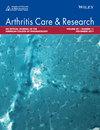American College of Rheumatology Guidance Statements for Addressing Mental Health Concerns in Youth With Pediatric Rheumatologic Diseases
Abstract
Objective
Pediatric rheumatologic diseases (PRDs) are characterized by high rates of anxiety and depression known to impact health-related outcomes. We present guidance statements to assess and manage mental health concerns for youth with PRDs in pediatric rheumatology practice.
Methods
Development of the guidance statements was initiated in 2019 and concluded in November 2023. It included (1) the formation of a task force (including pediatric rheumatologists, pediatric behavioral health providers, patients, and parents) led by two licensed pediatric psychologists and two board-certified pediatric rheumatologists, (2) iterative drafting of statements and rating of evidence based on the Oxford Centre for Evidence-Based Medicine levels of evidence, (3) an open comment period followed by revision of statements, (4) a Delphi panel process to attain consensus on the statements, and (5) review by the American College of Rheumatology (ACR) Committee on Quality of Care and refinement of statements to an identified list of those with the strongest empiric evidence for endorsement by the ACR.
Results
The task force drafted 34 statements for addressing mental health concerns in pediatric rheumatology, including identification, management, and clinic environment/education considerations. After two rounds of Delphi panel voting by a random sample of 76 members of the Childhood Arthritis and Rheumatology Research Alliance, 31 statements attained at least 80% consensus. Eleven of those statements had high empirical support and endorsement and were thus selected as the final guidance statements, including recommendations for depression and anxiety screening in youth aged 12 years and older, management of identified symptoms, and education of patients about mental health.
Conclusion
It is a goal that these recommendations be used to empower pediatric rheumatology teams to consider how they may better address mental health concerns in their setting and help improve both mental health– and health-related outcomes for youth with rheumatologic diseases.


 求助内容:
求助内容: 应助结果提醒方式:
应助结果提醒方式:


